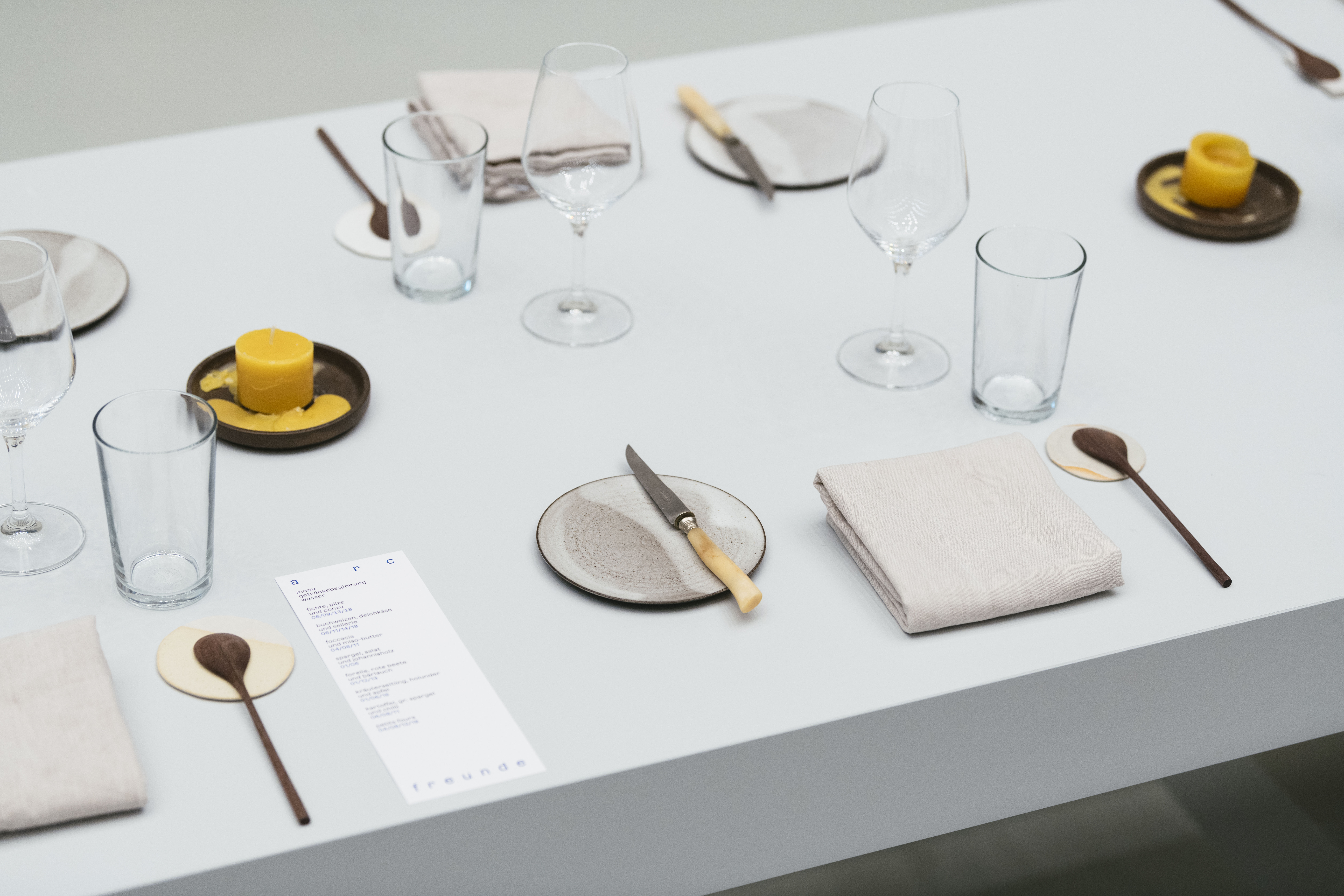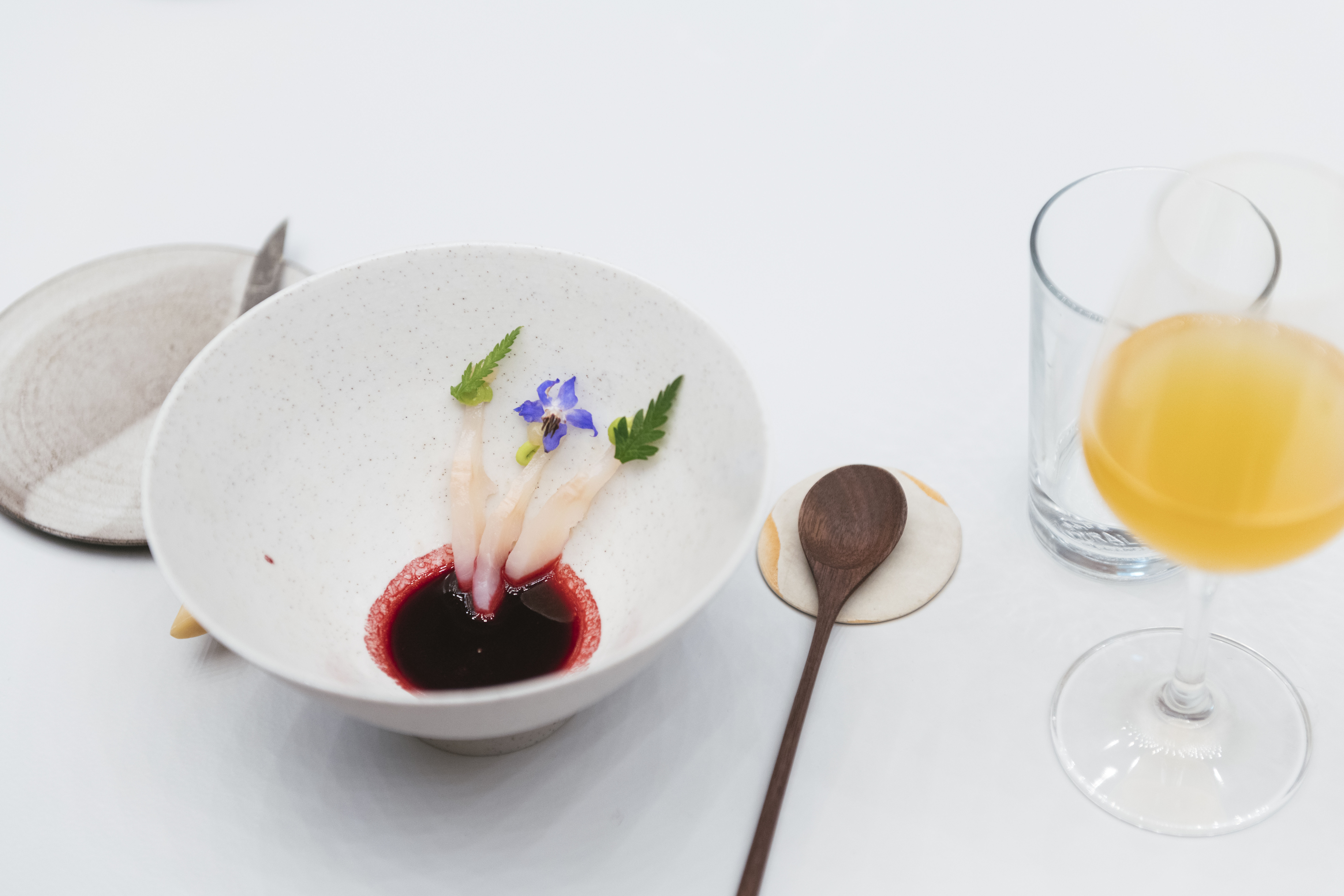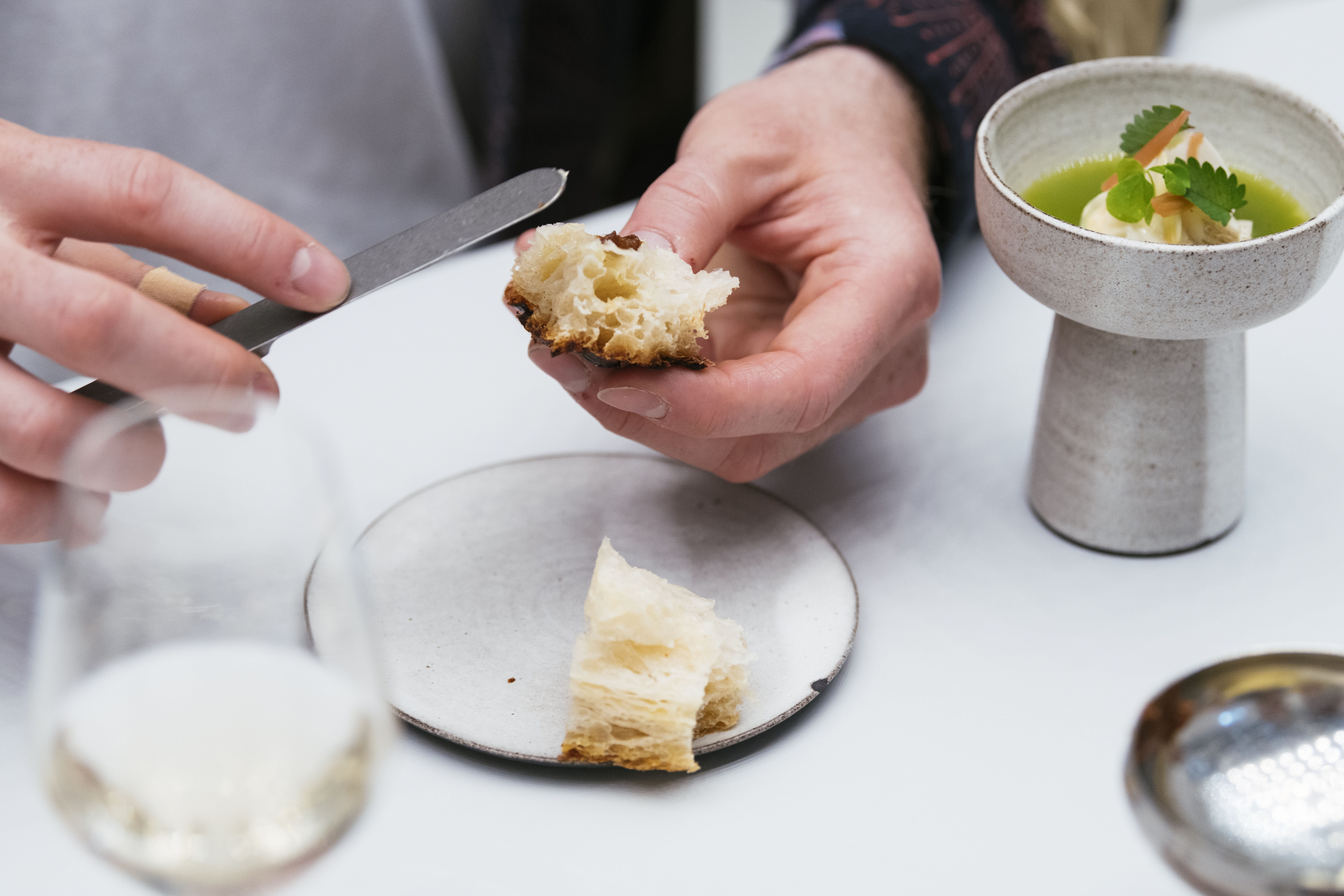Freundebuch
Imagine reading a menu, seeing a list of ingredients, as reading a book about your friends. Hearing about how they are doing, and what wonderful things they have been up to since the last time you met. Envision a fine dining experience that connects you to where you are, using products from Hamburg’s direct surroundings. For this imagination to become a reality, ARC has been growing their network of friends; local food producers, farmers, fishers and foragers. This work enabled them to create their ‘freundebuch’, a menu as a book, through which they connect their guests at the table to their circle of food-friends. During this Sunday lunch, through their menu and dishes they tell the stories of their friends, the people behind the ingredients on the plate and their ways of connecting to the land and waters of Hamburg.
During their Bauhaus of the Seas fellowship, they developed the Freundebuch further, and aimed to understand their way of working as a reproducible method.

A conversation between Franz Kirsch, Joshua Feldkircher and Julian Rickert, the faces behind culinary collective and restaurant ARC, and Katinka Versendaal on their culinary path, ideals and ambitions, ways of working and their fellowship in the Bauhaus of the Seas program.
KV: Let's start at the beginning. Where did you guys meet, and how did you decide to do something together?
Joshua: Franz and I met through a friend in Paris - I was part of a project there. We'd met super briefly before, and he texted me "I'm in Paris, let's grab some wine." We got inspired, went from the 10th to the 11th, had lots of wine and food with another friend. That's when things got more concrete about working together. Franz really pushed the idea forward, helped develop the actual concept. Julian got involved through Joshua, while they were doing an internship at the same restaurant. Initially, it was just this idea of having something of our own, we started with pop-ups, and developed from there into a restaurant.
KV: Can you tell more about how the idea got into shape back then?
Franz: We knew we wanted a wine bar. And it was pretty clear the guys wanted to cook more and were thinking about the menu.
Joshua: The menu concept came from something I'd been doing for years. Every birthday, I'd do this huge menu for my whole family - 13 courses. I started this when I was 12. My present was getting to buy all the ingredients, and I'd spend the whole year thinking about what courses I wanted to cook.
Franz: Can you imagine, he didn't even tell me about that until last week. Which is crazy because we spent so much time at the start debating if we should do the menu format - this would've been the perfect argument for it. With all of us having sustainability kind of in our DNA, or just growing up in families that care about where products come from and social issues, we knew that had to be part of the concept. We wanted to figure out an idea that would make us different from most places in Hamburg, and create something that really made sense.
KV: And from there on you build the Freundenbuch. How do you find these freunden (friends), the suppliers, and what standards do you hold them to? Do you have certain rules or an internal manifesto for choosing farmers, fishers, or cheese makers?
Franz: We're trying to develop the manifesto with time so others can apply the same rules, but right now they're very internal, personal even. When Josh and I started working on this properly, we met at the market and went to different producers. We'd ask them "How are you working? What are your principles? Would this project match you?" We found some people working very ecologically responsible and sustainably, looking to the future, but without any labels on their products. That taught us that not having an organic badge doesn't mean you can't work with someone - maybe they just don't want to pay for certificates, or are able to. What's clear for us is they need to be responsible in how they work. That's why we visit, to look at their operation and talk to them.
KV: These days sustainability is such a hyped word, that its significance has become watered down. Can you tell a bit more what you mean by ‘sustainable’? When is a producer sustainable to you?
Franz: Take our tomato producers for example. I'm not sure if they even have any labels, but they got the place from their parents. They didn't even use it anymore - it's really small, but they had the greenhouses already. They don't have to pay rent or pay for these greenhouses, while everyone around them is doing commercial agriculture. However, these two people who are now running it just have a good sense for quality and sustainability.
Joshua: They work on seedsaving, and grow like a thousand types. At the start of the season, they keep seeds from the tomatoes instead of selling them, to have tomatoes next year and maintain the varieties. They only grow the tomatoes where they need more seeds for the upcoming year - they don't plant all 10,000 varieties, just the ones they need in order to keep up the seeds. They also sell the seeds.

Franz: Another example would be our fish supplier. Some people would say completely vegetarian or vegan diets would be more sustainable, but we're working with three pillars of sustainability - economic, social, and ecological. We have a very fair economic model. We don't want to get rich, but we want our guests to get an amazing menu for a super fair price. This means we can't have too many animal proteins - you just can't afford that, both financially and eco-consciously.
Joshua: It's something we all talked about together because it makes sense to show people they can create great menus without using that many proteins. In the future there needs to be less. To create a weekend menu with your friends, you need to be able to produce something great without too many animal products, because otherwise we won't manage the crisis we have on this planet.
So here is where the three pillars come into play; our fish suppliers have a family-run business with a holistic approach; they have built ponds to keep fish, these ponds are connected to a little river that circulates the water. They use natural clay walls so fish can hide, not concrete pools, very similar to their natural habitat. They feed them by hand, not with machines, so they can monitor the fish's health and support them where needed. And believe this to be a good and responsible way to introduce some animal protein on the menu.
KV: How does this translate to a menu, you have the meat of the fish, but I noticed also a dessert with fish skin. From the farm into the kitchen - tell me what you do with the fish? What happened to that skin and what's the thought behind it?
Joshua: The actual thought came from having skin leftovers with no use for them. The idea was to use all parts of the fish throughout the menu. We roast the bones over open fire and make sauce from them. After filleting, what's left is the skin and intestines.
It's quite common to dry and fry the skin as a chip, but not in dessert. There's a fishy flavor left, which is why we soak them with salted water for a day. The skin gets saltier and the fishy flavor goes away somewhat. We cook them in water with coriander seeds so the skin gets a little flavored, then dry it for a day. The dried skin can be fried in very hot oil and it puffs up, gets airy like a crispy chip, like a rice waffle. Then we cover it in dark chocolate. The salty notes compliment the chocolate very well.
KV: What's the feedback from guests on something like that?
Franz: When you tell them they've had the whole fish throughout the menu, with this particular dish, most are really surprised. This isn't something many people in Hamburg see, even in fine dining. I think it's because there's a certain conservative attitude about eating here. But the people coming to our place are at least curious enough. The second time they come, they've already changed - that's what's most interesting. The first time they're still hesitant, but the second time they just flow with the evening. You can see they want to try, they are curious now. That is where we bring the fish skin, especially a surprise as the last course. That's a bold statement by us, but I think they will remember us for it.

KV: Can you say something on how seasons and other natural rhythms play a role in your work? On the menu? And specifically in what your restaurant or your personal year, weeks, months, days look like?
Joshua: It affects us very closely, because we work directly with the farmers. When they have vegetables or fruit ready, we need to buy it because there's no other chance to get these regional products until next year. If you want to use it all year round, you need to preserve it. During the season, there's a lot of work preserving things we can use during winter. In winter, we use available products like fish, milk products, meat, or vegetables that can be stored - potatoes, onions, beetroot, butter. Everything else needs to be preserved ahead.
Franz: Last week we got a lot of blackcurrants from our supplier, and obviously we need to process them quickly before they go bad. So next to our already full calendar, we have to seal lots of vacuum bags and glasses, and ferment, put products in specific containers to use in winter.
Joshua: We have a supplier that grows peas for the soil, but it's not economical for them to pick them all. But they need to be picked and sold, otherwise the plant dies. They need to keep picking them even though it's more work to disturb the soil than the money they make selling them. But it's good for us because we love peas!
Franz: It's interesting because in that situation, it's not us asking for product, but them asking us. Like, "I have a bunch of this, can you take them off me? Because otherwise my plants might die.”
Joshua: People should realize communication with producers shouldn't be one-sided but reciprocal. If they say "I don't have this," we ask "what do you have? We could work with it."
Actually, it's funny because we come from haute gastronomy where it's normal to call suppliers and send photos if the product isn't good. We started out with that attitude but realized quickly it wouldn't work if we only complained all the time. We realized we needed to learn to respect their work and learn how to communicate better in advance, and build a relationship that goes back and forth. You know, like friends.
